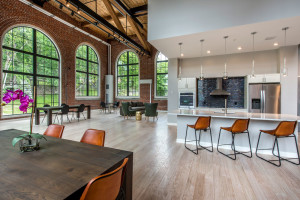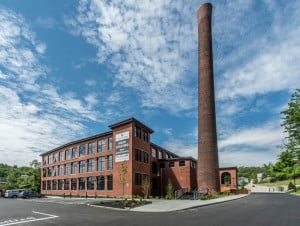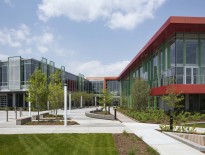City officials and developers know that Fitchburg is unlikely to become the next Somerville, the once hard-scrabble city that’s now one of the hottest and hippest places to live and work in Massachusetts.
Still, they’re optimistic that Fitchburg – an officially designated Gateway City north of Worcester with its own commuter rail station, historic downtown mills and Fitchburg State University – will continue to attract new developments and residents that could transform the city of 40,000 people along the Nashua River.
WinnDevelopment, a unit of Boston-based WinnCompanies, last fall completed its $24.2 million conversion of a 112-year-old former yarn mill on Main Street into a 96-unit mixed-income residential complex, now known as the Yarn Works. It’s WinnDevelopment’s second project in Fitchburg in four years, following its conversion of a public housing high-rise into the residential Fitchburg Place.
At this time, WinnDevelopment has no other plans for another project in Fitchburg, though the firm’s chief says “inquiries have been made” about other potential development sites in the city.
But other developers are making more than just passing inquiries. Pending development plans are now awaiting word on financing and other details to proceed with the conversions of an old school building and the former Harper’s Furniture store, both located in the city’s downtown.
“We believe in Fitchburg,” said Larry Curtis, president and managing partner at WinnDevelopment, known for its historic building conversions in Gateway Cities across the state, including projects in Lowell, Lawrence and Ludlow. “People are being driven out of the Boston area because of high housing costs. They may want to live in Cambridge or Boston, but they can’t afford it. So we think places like Fitchburg are well situated to get some of those (residents).”
 At the Yarn Works, rents range from a low of $800 and up for one-bedroom apartments to $1,200 and up for three-bedroom units – prices that are less than half of similar apartments in the Cambridge-Boston market. Sixty percent of the Yarn Works’ apartments rent at market-based prices, while 40 percent are officially designated as affordable units.
At the Yarn Works, rents range from a low of $800 and up for one-bedroom apartments to $1,200 and up for three-bedroom units – prices that are less than half of similar apartments in the Cambridge-Boston market. Sixty percent of the Yarn Works’ apartments rent at market-based prices, while 40 percent are officially designated as affordable units.
Curtis said demand has been strong for the rental units – and the demand has shown WinnDevelopment made the right decision.
Jon Rudzinski, owner of Rees-Larkin Development LLC in Jamaica Plain, said the success of the Yarn Works indicates that his company is on the right track in its push to convert the old Harper Furniture store and two adjacent parcels into a 42-unit mixed-use complex in Fitchburg’s Moran Square area.
The proposed $21 million project includes the rehab of two buildings and the ground-up construction of a third building, Rudzinski said. It will also have about 12,000 square feet of ground-floor commercial space, he said.
Located only a block away from Fitchburg’s downtown Intermodal Transportation Center, Rudzinski said he’s convinced his project will be a big success, once Rees-Larkin secures the necessary state and federal tax credits that most conversion projects, including Yarn Works, need to complete their financing packages.
Realistically, he sees construction starting in 2019, though he’s not ruling out a best-case scenario of construction starting this fall.
A Lure for Priced-Out Creatives
Nonprofit community development corporation NewVue Communities is also in the planning stages of converting the old B.F. Brown School and two other buildings – an old high school annex and a former city stables facility – into 55 rental units for artists, said Executive Director Marc Dohan.
The final complex, which will include artist work spaces, is across the street from the Fitchburg Art Museum, which is a partner in the $20 million to $25 million project.
Market studies have shown there’s a strong demand for housing for those in the “creative economy,” from full-time painters and sculptors to architects and even video game designers, Dohan said.
“We think this will be something very attractive for artists from around the area,” he said.
Like Rudzinski, Dohan said NewVue is planning to use state and federal tax credits to finance construction. After the city transfers the deed to his nonprofit group, Dohan said he hopes preliminary repairs can start later this year on the former school, which was hit by a fire a year ago, delaying the entire project.
The city is encouraged by the recent completion of the Yarn Works complex and the proposed conversions of facilities by Rees-Larkin and NewVue Communities, said Fitchburg’s Executive Director of Economic Development Mary Jo Bohart. Fitchburg is hoping to attract other developers – for both residential and commercial developments, she said.
“It’s all a work in progress,” she said, adding that Fitchburg needs more retail establishments and restaurants to liven up the downtown. “We have a way to go. But the downtown has a very urban feel, with a lot of historic buildings and Fitchburg State University. Things are happening. So we’re optimistic.”




 |
| 




